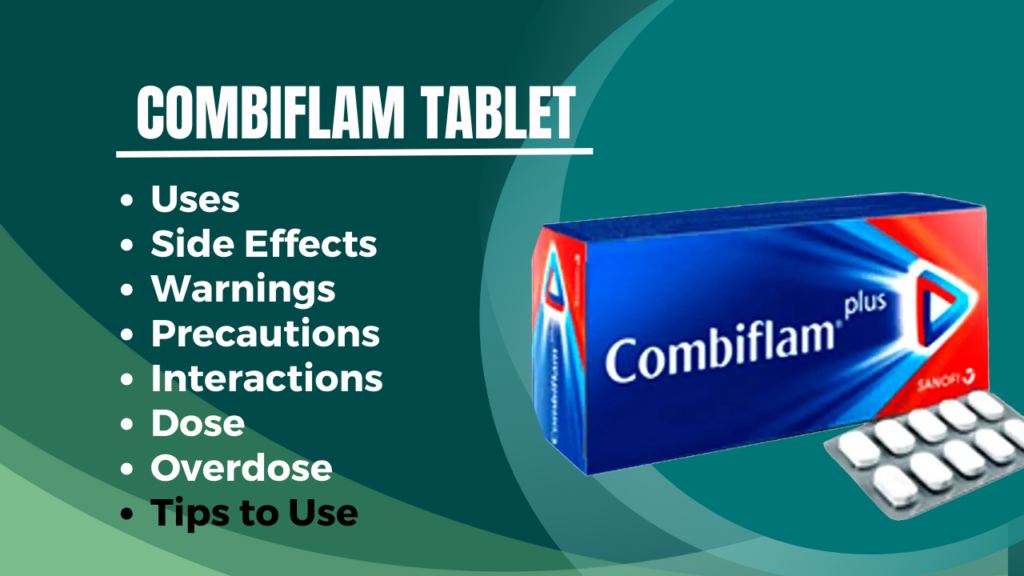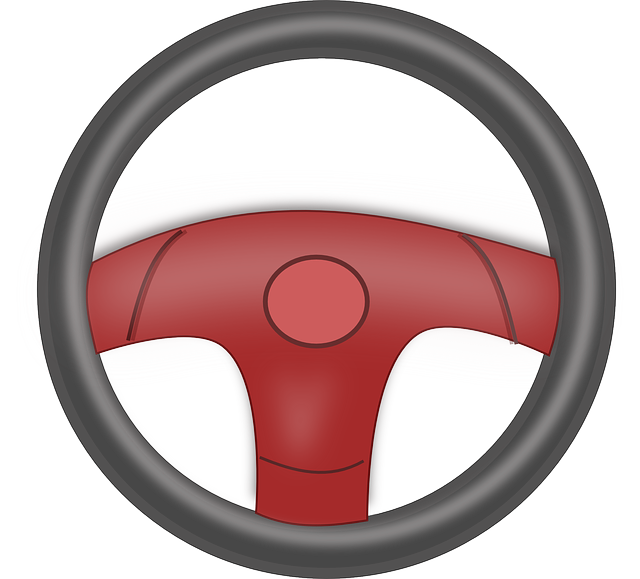Combiflam Tablet : What is Combiflam Used for, Tab Combiflam, Combiflam Uses, Side Effects

Combiflam Tablet: Combiflame is a combination of ibuprofen and paracetamol. For the relief of pain and fever, it is mainly used. In most cases, this medicine uses in India.
It also has antipyretic properties. Its major side effect is liver damage, which occurs on repeated use at high doses.
Paracetamol Tablets | AlphaWave L-Theanine Uses | NexoBrid Uses
Content
- Description
- Combiflam Composition
- What is Combiflam Used for?
- When to avoid Combiflam Tablet?
- How does Combiflam Tablet Work?
- How to Take Combiflame?
- Combiflam Tablet Doses
- Which medicines should not be used while taking Combiflam Tablet?
- Precautions of Combiflame Tablets
- Combiflame Side-Effects
- Allergic Reactions (Combiflam Tablet)
- Effects of Combiflam Tablets on Organes
- Interaction with Combiflam Tablet
- Effect of Combiflame Tablets on Lab Test
- Storage Requirements for Combiflam Tablets
- Combiflam Tablet Substitutes
- Facing of Combiflam Tablet Side effects
- FAQ’S (Warning)
- Frequently asked questions
- Conclusion
Description
This Combiflam should be avoided for those who have a gastric ulcer or any liver disease.
- Composition – paracetamol 325 mg + ibuprofen 400 mg
- Created by – Sanofi India Limited
- Prescription – Required (belongs to Schedule ‘H’) but also available as OTC
- Features – Tablets
- Price – 28.63 (20 tablets)
- Expiry – 24 months from date of manufacture
- Drug type – Analgesic, and antipyretic
It is a very easy drug that most people know and use, but just as it should be fully understood before taking any medicine, it is very important to know about Combiflam.
Combiflam Ibuprofen is made from an active chemical such as 400 mg and Paracetamol 325 mg, a non-steroidal anti-inflammatory drug (NSAD) which is an inflammatory and pain reliever. It reaches into the body and controls our hormones.
It is also used for mild pain such as toothache, headache, back pain, and Aram for spasms in menstrual pain. This can be given to children above 6 months of age and older.
This Combiflam should be avoided for those who have a gastric ulcer or any liver disease.
Combiflam Tablet Composition
- Combiflam Tablet: Ibuprofen (400 mg), Paracetamol (325 mg).
- Tablet (Combiflam Tablet): Ibuprofen (100 mg), Paracetamol (162.5 mg).
- Tablet (Combiflam Plus Tablet): Caffeine (50 mg), Paracetamol (650 mg).
- CombiflamIcyHot 15 GM Gel: Diclofenac Diethylamine (1.16% w / w), Methyl Salicylate (10% w / w), Menthol (5% w / w), Virgin Linseed Oil (3% w / w).
- CombiflamIcyHot 35 GM Gel: Diclofenac Diethylamine (1.16% w / w), Methyl Salicylate (10% w / w), Menthol (5% w / w), Virgin Linseed Oil (3% w / w).
What is Combiflam Used for?
Combiflam serves as a dual purpose as it works for pain as well as fever. It is prescribed for the following:
Fever
It is used for fever because it contains paracetamol which is anti-pyretic in nature.
Headache
Used as a pain reliever because it contains Ibugesic (NSAIDs).
Muscle pain
Used to treat muscle pain in the case of osteoarthritis and gout.
Menstrual Cramps
Used to treat stomach cramps during the menstrual cycle in women.
Toothache
It uses to treat mild to moderate pain in the teeth.
When to Avoid Combiflame Tablets?
Do not consume Combiflam Tablet in the following scenarios:
Allergic
Induces an allergic reaction to combiflam (paracetamol, ibuprofen) or other NSAIDs (aspirin, diclofenac).
Asthma
An asthma attack, irritation, and inflammatory condition on the nose and face in cases of Combiflam or other NSAIDs.
With a history or currently suffering from bronchial asthma, bronchospasm may occur in patients.
Gastric problems
In known cases of the intestine or stomach ulcers, because comfiflam can create stomach bleeding.
Liver diseases
In cases of past or present condition of liver problems.
Kidney diseases
In the case of kidney diseases in past or present condition.
Heart disease
In cases of the current state or history of heart diseases such as heart failure or stroke.
Blood disorders
In cases of blood disorders like porphyria and also in cases where the patient is more likely to have bleeding.
How does Combiflam Tablet Work?
By inhibiting the Cyclo-oxygenase (COX) enzyme combiflam works. which further inhibits the production of prostaglandins which are the reason behind the onset of pain. Prostaglandins cause pain, swelling, and redness at the site of injury.
Therefore, when the production of COX enzymes interruptss. The production of prostaglandin also disrupts which in turn reduces pain, and increases blood flow to the skin. Ibuprofen and paracetamol inhibit COX enzymes and reduce pain.
How to Take Combiflame?
Combiflam is commonly available in tablet and suspension forms. Usually, the tablets use orally (via mouth) with a glass of water as instructed by the physician.
It should be taken with food or after a meal, and not with an empty stomach because the acidic content of the empty stomach can affect the medicinal activity of the tablet and may even affect the stomach.
The tablet should never be crushed or chewed.
Before consuming the suspension form of combiflam, the homogenous mixture of the drug should be stirred properly.
The patient advises going through the leaflet inside the package to have a better understanding of the medicine.
Combiflam Tablet Doses
According to the patient’s age, weight, mental state, history of allergy, the dosage of the drug should be fixed for each person.
The usual dose of Combiflam determine according to the severity of the pain and there should be a difference of at least 4-6 hours between the two doses.
Consuming more than the prescribed dose daily can cause liver damage and severe allergic reactions like swelling of face, lips, throat.
Which medicines should not be used while taking Combiflam Tablet?
Many times we use more drugs with Combiflam, due to which there can be a change in its efficacy, due to which its side effects may increase.
In this case, you should take Combiflam and other medicines only after consulting your doctor.
Taking the following medicines and products may cause an incorrect effect:
- Cyclosporine
- Lithium drugs
- Interfere with certain laboratory tests
- Aspirin
- Corticosteroids
- Ketoconazole
- Leflunomide
- Methotrexate
- Alcohol
- Jushtpeedipomersen
Precautions of Combiflame Tablets
Empty stomach
Do not take Combiflam empty stomach as it may reduce the efficacy of the drug and may also cause stomach upset.
Allergic reaction
Any allergic reaction should be reported to the doctor immediately.
Avoid overdose
The overdose of medicine should be avoided.
Time interval
To avoid increased levels of the drug in the blood, an interval of 4-6 hours should be maintained between the two doses as it may cause toxicity.
Combiflame Side-Effects
The following are the side effects associated with Combiflam tablets used for various treatments:
- Hartburn – General
- Vertigo – General
- Rash itchy skin – rare
- Liver poisoning – rare but major side effects due to repeated overdose of the drug
- Dizziness – Less common
- Nausea – normal
- Epigastric discomfort – less common
- Indigestion – Less Common
- Insomnia – Less Common
- Diarrhea – General
- Stomach ache – less common
Gastritis (if taken often on an empty stomach)
- Vomiting – less common
- Mouth Ulcers – Less Common
- Constipation – General
- Decreased urine output – rare
- Yellowing of eyes/skin – Decreased
Allergic Reactions (Combiflam Tablet)
The possible allergic reactions reported for Combiflam tablets are:
- Extreme pain – Less common
- Wheezing – General
- Difficulty breathing – Less common
- Vomiting – Normal
- Rare itching and skin rashes and itching are rare but can be caused by an allergy to combiflam
- Sores tender (painful) on mouth and lips – Rare
Effects of Combiflam Tablets on Organes
Combiflam dose should be reduced in patients with liver disease as high doses of paracetamol may increase the likelihood of further liver damage.
The doctor should be consulted before taking Combiflam Tablet. If someone is suffering from kidney disease, appropriate dose adjustment and monitoring of kidney function is mandatory in such cases.
Interaction with Combiflam Tablet
Some medicines should be cautious when taking Combiflame. These may include some tests ranging from certain foods to other medications, which should not be correct after intake of Combiflame. Its details are below:
Food Interaction with Combiflame Tablets
Apart from alcohol, no particular food item can be avoided as it can cause liver damage.
Drug interactions with Combiflame Tablets
Not all possible drug interactions can be listed here. It is always advised that the patient should inform the doctor about all the drugs/products you use.
You should also give information about the herbal products that you are consuming. Without your doctor’s approval, You should not modify the revision of the medicine.
The drug interactions have their own consequences and effects, which can be further identified as mild or severe:
- Cholestyramine and metoclopramide (cholesterol-lowering elements) (mild)
- Some nonalcoholic analgesics such as diflunisal (mild)
- Anticonvulsant drugs -Carbamazepine (mild)
- Antibiotics like quinoline, isoniazid (mild), amobarbital, butalbital, pentobarbital, phenobarbital.
- Hydentase, long-term exposure to rifampin increases the likelihood of toxicity. (serious)
- Steroids (Mild): Increases the risk of gastrointestinal bleeding.
- Other non-steroidal anti-inflammatory agents such as aspirin, ibuprofen (severe): An increase in the concentration of NSAIDs in the blood may cause gastric irritation and in some cases bleeding.
- Diuretics (drugs used to increase the rate of urinary excretion) (mild): Increases the likelihood of kidney damage. Medications used to lower blood sugar levels in diabetics.
- Methotrexate (used to treat cancer, arthritis) (severe): As it may cause bleeding and breathing problems when taken with Combiflame.
- Ciclosporin and tacrolimus (drugs used to suppress the immune system).
- Medications used to treat high blood pressure (antihypertensive) (mild).
- Digoxin (used to treat the failure of heart and heartbeat irregularity).
Effect of Combiflame Tablets on Lab Test
In high doses of repetition, there is no effect on any laboratory tests other than the potential damage to the liver.
Storage Requirements for Combiflam Tablets
In a moisture-free place, cool at temperatures below 25o, the drug should be stored. The medicine should be kept in a place where it is out of the reach of children.
Combiflam Tablet Substitutes
There are many other alternatives to the Combination tablet. like:
- Brufamol Tablet
- Dolomed 400mg / 325mg Tablet
- Brumol 400 mg / 325 mg Tablet
- Fenceta 400mg / 325mg Tablet
- Lupiflam 400 mg / 325 mg Tablet
Facing of Combiflam Tablet Side effects
Here, some tips to deal with some common side effects. But, it is necessary that you consult the doctor if you get any side effects.
Heartburn
Avoid foods that create irritation in the stomach like- alcohol, carbonated soft drinks, citrus foods, coffee, fatty foods. You should need to eat or drink slowly. Large meals fill the stomach and apply pressure that create reflux, so use smaller meals. In case of heartburn, quit smoking.
Lose weight if you are overweight. Avoid tight waistbands.
After taking food do not lie down immediately. Wait at least three hours for lying down after consuming a meal. Contact your health consultant or doctor if you do not get relief.
Indigestion
You try to taking medicine after or with meal/snacks. Avoid fatty foods, spicy foods, caffeine, carbonated soft drinks, mints, and citrus fruits. Eat or drink slowly. Quit smoking. If you feel no improvement then make a call to a health consultant (doctor).
Vomiting (Nausea)
In case of nausea, do not eat fatty, fried, spicy, and very sweet foods. Eat cold or slightly warm foods and drink plenty of fluids. You chew ginger or use ginger tea. Potassium in your blood can reduce if you are sick, so use banana fruit. Due to lack of potassium vomiting can take place. During sickness vitamins and minerals can reduce, so use oral rehydration salts. If patients condition not improve then contact health consultant (doctor).
Stomach Pain
More rest and relax is good for stomach pain problem. A bottle filled with hot water rolling on the stomach can give relax. Avoid consumption of tea, coffee for better results. Also, avoid alcohol intake. Contact your health consultant or a doctor if you feel not good.
Warning (Advice)
Driving
It is advisable not to drive a vehicle after taking Combiflam medicine. This is because the use of this medicine can cause dizziness, vomiting, and nausea and it becomes difficult for them to concentrate on driving.

Liver
The patient suffering from liver-related problems should not take this medicine.

Breastfeeding
Be sure to ask the doctor about this and make the decision according to their advice.

Alcohol
Consumption of alcohol is not recommended on Combiflam Tablet. The interaction of this medicine and alcohol may increase the risk of side effects and may cause excessive drowsiness and calmness. It increased the risk of liver damage.

Pregnancy
During pregnancy, it may be harmful. So, you should consult a gynecologist for more information before taking the medicine. The doctor should always be informed if you are pregnant or planning to become pregnant as Combiflame recommends for pregnant women.

Kidney
A patient who has severe kidney diseases are not recommended to take this medicine. So, follow the prescriptions of doctors for using this.

Frequently Asked Questions (FAQ’s)
Q. What is combiflame?
Ans: Combiflam is not basically a single drug; It is a combination of two drugs: ibuprofen and paracetamol. It serves a dual purpose as it has analgesic (reduces pain) and antipyretic (reduces fever) properties.
This is mostly used to treat mild to moderate pain. It can also be used in cases of fever as it also has antipyretic properties.
Q. What are the uses of Combiflam?
Ans: Combiflam works for both pain as well as fever. It is usually taken in cases of headache, muscle aches, menstrual cramps, and toothache. Ques:
Q. What are the side effects of Combiflam?
Ans: The most commonly Combiflam have side effects are heartburn, dizziness, nausea, diarrhea, and constipation.
Q. Which special foods should be avoided?
Ans: There is no need to avoid any special foods when taking Combiflam.
Q. Can Combiflame be taken while breastfeeding the infant?
Ans: The doctor should always be informed if you are breastfeeding your baby as a precaution because COMPFLAM is not recommended for a breastfeeding mother.
Q. Can I drive after taking Combiflame?
Ans: Anyone can drive after taking Combiflam, but if there is any dizziness or drowsiness, then driving should be avoided.
Q. How effective is combiflame?
Ans: Combiflame is effective as a pain reliever due to its pain-relieving properties. However, as an antipyretic, there are other drugs that have better performance when used for treating fever.
Q. How long does combiflame take to show results?
Ans: Combiflam drug relieves fever and pain within 30-45 minutes.
Q. Should Combiflam be taken on an empty stomach?
Ans: It should not be taken on an empty stomach as the components may cause stomach irritation and in rare cases of patients already suffering from gastric ulcer or any other gastric problem, bleeding may occur.
Q. Does Combiflame Drunk You?
Ans: In some cases, it can cause drowsiness, but it varies with every person
Q. What happens if I overdose on Combiflame?
Ans: In the case of combiflam overdose, a doctor should be consulted immediately.
Q. What happens if I forget to take a dose of Combiflam?
Ans: The drug may not show the proper effect if you miss a dose, because, for the effective functioning of the drug, a certain amount of medicine must be present in your body at all times. Always take the forgotten dose as soon as you remember it.
However, if you have already taken a second dose, do not take double doses as it may cause drug overdose.
Q. What happens if I use expired medicine?
Ans: an adverse event is unlikely to occur with a single dose of expired medicine. However, if someone feels unwell or ill after taking an expired medicine, medical advice should be taken. It is advisable to avoid using expired medicine.
Q. What is the start time of combiflame?
Ans: pills show results in about 30–45 minutes.
Q. How long does Combiflam last?
Ans: The effect of Combiflam lasts for 5 to 6 hours.
Q. What should be the time difference between the intake of Combiflam Tablet?
Ans: An ideal time interval of at least 4-6 hours should be between the two doses to avoid combiflame poisoning.
Q. Should I complete the entire cycle of medicine even when I am recovering?
Ans: Combiflam relieves symptoms such as fever and pain if the symptoms disappear completely, then one can gradually close the drug cycle.
Q. Does Combiflam affect my menstruation?
Ans: The effects of Combiflam on the menstrual cycle is not known. Consult the doctor in case of current menstrual problems before consuming the drug.
Q. is Combiflame safe for children?
Ans: Combiflam should not be consumed in children under 1 year of age without consulting a pediatrician. Thus, Combiflam Syrup may be advised in such cases.
Q. Are there any symptoms that I should assume before consuming Combiflam?
Ans: Gastric irritation and liver-related problems should be taken into consideration before consuming Combiflam.
Q. Is Combiflam legal in India?
Ans: Yes, it is legal and manufactured by Sanofi India Limited.
Conclusion
It is very important to consult your medical consultant (doctor) before taking Combiflam Tablet.
Disclaimer
- It does not guarantee or can take any guarantee of the accuracy or completeness of the information provided under this article.
- This website/blog will not be held responsible for any aspect of health services administered with the information provided in this article.
- This post is not related to the promotion of any type of product. Its purpose is just to give important information.
